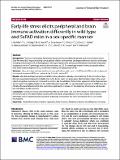Por favor, use este identificador para citar o enlazar a este item:
http://hdl.handle.net/10261/305556COMPARTIR / EXPORTAR:
 SHARE SHARE
 CORE
BASE CORE
BASE
|
|
| Visualizar otros formatos: MARC | Dublin Core | RDF | ORE | MODS | METS | DIDL | DATACITE | |

| Título: | Early-life stress elicits peripheral and brain immune activation differently in wild type and 5xFAD mice in a sex-specific manner |
Autor: | Bachiller, Sara CSIC ORCID; Hidalgo, Isabel; García, M. G.; Boza-Serrano, Antonio CSIC ORCID; Paulus, Agnes; Denis, Q.; Haikal, C.; Manouchehrian, O.; Klementieva, Oxana; Li, J. Y.; Pronk, C. J.; Gouras, Gunnar K.; Deierborg, Tomas | Palabras clave: | Alzheimer’s disease Early-life stress Immunity Maternal separation Neuroinflammation Sex differences |
Fecha de publicación: | 15-jun-2022 | Editor: | BioMed Central | Citación: | Journal of Neuroinflammation 19: 151 (2022) | Resumen: | [Background] The risk of developing Alzheimer's disease (AD) is modulated by genetic and environmental factors. Early-life stress (ELS) exposure during critical periods of brain development can impact later brain function and health, including increasing the risk of developing AD. Microglial dysfunction and neuroinflammation have been implicated as playing a role in AD pathology and may be modulated by ELS. To complicate matters further, sex-specific effects have been noted in response to ELS and in the incidence and progression of AD. [Methods] Here, we subjected male and female mice with either a wild type or 5xFAD familial AD-model background to maternal separation (MS) from postnatal day 2 to 14 to induce ELS. [Results] We detected hippocampal neuroinflammatory alterations already at postnatal day 15. By 4 months of age, MS mice presented increased immobility time in the forced swim test and a lower discrimination index in the novel object recognition memory test compared to controls. We found altered Bdnf and Arc expression in the hippocampus and increased microglial activation in the prefrontal cortex due to MS in a sex-dependent manner. In 5xFAD mice specifically, MS exacerbated amyloid-beta deposition, particularly in females. In the periphery, the immune cell population was altered by MS exposure. [Conclusion] Overall, our results demonstrate that MS has both short- and long-term effects on brain regions related to memory and on the inflammatory system, both in the brain and periphery. These ELS-related effects that are detectable even in adulthood may exacerbate pathology and increase the risk of developing AD via sex-specific mechanisms. |
Versión del editor: | https://doi.org/10.1186/s12974-022-02515-w | URI: | http://hdl.handle.net/10261/305556 | DOI: | 10.1186/s12974-022-02515-w | E-ISSN: | 1742-2094 |
| Aparece en las colecciones: | (IBIS) Artículos |
Ficheros en este ítem:
| Fichero | Descripción | Tamaño | Formato | |
|---|---|---|---|---|
| Early_life_Bachiller.pdf | 7,95 MB | Adobe PDF |  Visualizar/Abrir |
CORE Recommender
PubMed Central
Citations
7
checked on 30-abr-2024
SCOPUSTM
Citations
10
checked on 02-may-2024
WEB OF SCIENCETM
Citations
9
checked on 29-feb-2024
Page view(s)
20
checked on 02-may-2024
Download(s)
14
checked on 02-may-2024

